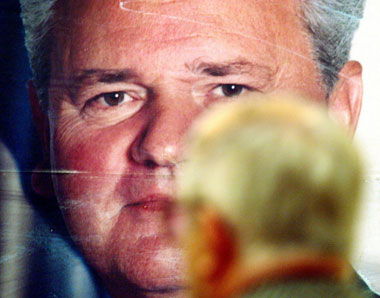|
Ex-Yugoslav leader Milosevic dies in cell
(AP/Reuters)
Updated: 2006-03-12 08:55
THE HAGUE, Netherlands - Former Serb leader Slobodan Milosevic was found dead
in his prison cell Saturday, abruptly ending his four-year U.N. war crimes trial
for orchestrating a decade of conflict that killed 250,000 people and tore the
Yugoslav federation asunder. He was 64.
A leader of beguiling charm and cunning ruthlessness, the man reviled by the
United States as "the butcher of the Balkans" was a hero to many Serbs despite
losing four wars and impoverishing his people in the 1990s while trying to
create a "Greater Serbia" linking Serbia with Serb-dominated areas of Croatia
and Bosnia.

A supporter of
Slobodan Milosevic looks at a giant poster of the late Yugoslav leader in
the headquarters of pro-Milosevic support group "Freedom" in Belgrade
March 11, 2006. [Reuters] | Milosevic apparently
died of natural causes, according to the U.N. tribunal that was trying him on 66
counts of genocide, war crimes and crimes against humanity. His chronic heart
ailments and high blood pressure had caused numerous long recesses.
His death came nearly five years after he was arrested by Serb authorities
and extradited to The Hague as the first sitting head of state ever to be
indicted for war crimes.
It meant there would be no judicial verdict for the leader accused of ethnic
massacres and other atrocities in Croatia, Bosnia and Kosovo and was sure to
increase criticism of the tribunal for what has been a long, expensive and
ultimately wasted proceeding.
The trial, which began in February 2002, will be terminated, tribunal
spokeswoman Alexandra Milenov said.
The chief U.N. war crimes prosecutor, Carla Del Ponte, expressed regret,
saying she believed she would have won a conviction.
"I also regret it for the victims, the thousands of victims, who have been
waiting for justice," Del Ponte told Swiss Television DRS while visiting her
native Switzerland.
Former President Clinton, whose administration confronted Milosevic's regime,
also lamented that no verdict would be reached.
"I am sorry that his trial will not be completed, and that he did not
acknowledge and apologize for his crimes before his death. Nevertheless, his
capture and trial will serve as a reminder that egregious crimes against
humanity will not be tolerated," Clinton said in a statement released by his
office in New York.
Milosevic was accused of being behind a brutal campaign of ethnic cleansing
against non-Serbs during the wars that erupted as the Yugoslav federation began
breaking apart in 1991, and his death was cheered by many in the Balkans.
"Finally, we have some reason to smile. God is fair," said Hajra Catic, who
heads an association of women who lost loved ones when ethnic Serb troops
slaughtered 8,000 Muslim men and boys in the eastern enclave of Srebrenica in
1995.
In Serbia, where many people praised Milosevic for trying to preserve Serb
dominance, supporters declared his death a "huge loss."
The tribunal said a guard at the U.N. jail in suburban Scheveningen found
Milosevic's body between 9 a.m. and 10 a.m. Saturday. The timing of his death
was not released. An autopsy will be conducted Sunday by Dutch officials 錕斤拷 with
a pathologist from Serbia-Montenegro in attendance.
Milosevic's older brother, Borislav, said the family did not trust the
tribunal to carry out an impartial autopsy.
He also blamed the tribunal for his brother's death because it rejected his
request to get medical treatment in Russia, which offered assurances that
Milosevic would be returned to finish his trial.
"All responsibility for this lies on the shoulders of the international
tribunal. He asked for treatment several months ago, they knew this," Borislav
Milosevic told The Associated Press in Moscow, where he lives. "They drove him
to this as they didn't want to let him out alive."
|